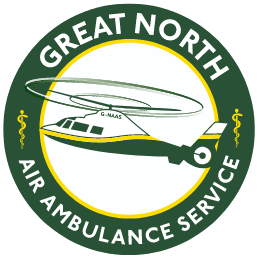A year ago, Marc Reed’s life was hanging in the balance after being struck by a car at high speed as he walked home following a night out in Bishop Auckland. He had sustained catastrophic injuries that medics treating him thought he would not survive.
But now, the 28-year-old from Hunwick took the latest steps in his remarkable recovery by meeting the doctor and paramedic team that saved his life.
The incident happened in the early hours of Sunday, August 11, 2013. Mr Reed was hit by a taxi on Newton Cap Viaduct, leaving him unconscious and with widespread and severe injuries.
A road ambulance crew was first on scene, joined shortly afterwards by a team from the Great North Air Ambulance Service (GNAAS), who were working in a road vehicle on a trial scheme run in conjunction with North East Ambulance Service.
The charity brought two paramedics and emergency department consultant Mike Davison to the scene, all of whom were working on a voluntary basis. Mr Reed would have had to wait until he was at hospital before he was seen by a doctor, a journey he is unlikely to have survived.
Instead, he was given life-saving care at the roadside by Dr Davison, who is also an Army doctor, and who was able to administer advanced level drugs and treatments on scene.
GNAAS paramedic Jane Peacock said: “Seeing Marc in the back of the ambulance, we didn’t think he was going to make it, that’s how bad he was.”
Mr Reed had sustained a severe brain injury, broken neck, ribs and lacerated spleen, among many other serious injuries. He had stopped breathing three times and was in a coma.
On the Injury Severity Scale, an established medical score, Mr Reed was given a 58. The scale runs from 1, least serious, to 75. Fifteen is what is normally classed as being a major trauma.
Dr Davison, who returned to work in Afghanistan earlier this month, said: “This score basically means he had a one in 250 chance of survival. The only place I’ve seen injuries as serious is on the battlefield.”
Arriving at James Cook University Hospital was just the start of Mr Reed’s journey. He was in intensive care for a month, then in a high dependency ward after that. He did not speak for five months.
His mother Alison Reed described the moment he first spoke, on New Year’s Eve, 2013.
She said: “I was holding his hand and saying ‘it’s mum’, and then he said ‘mum’. I said ‘your dad’s here too’ and he said ‘dad’.
“I then said ‘I know I’m pushing it, but can you just say I love you?’ and he just said ‘I love you’. We were all crying.”
Mr Reed, who is now learning to walk again and hopes to return to work in the future, said: “I’m just grateful for every breath that goes in my mouth. I’m just taking it all in.”
Mrs Reed said the whole family were “immensely proud” of Mr Reed and how he has handled the incident.
“I just want to shout it from the rooftops,” she said. “We can never thank the crew enough for what they did. We are forever in their debt.”
Dr Davison said it was an emotional moment being reunited with Mr Reed. “He can accomplish anything he wants to,” he added. “It’s all down to spirit. Marc just had that will to live, and ultimately, that’s what got him through this.”
Meanwhile, talks are ongoing about the future of the rapid response service after what was a busy and successful trial.
*Mrs Reed would like to thank Hogan’s pub and all those in Bishop Auckland who helped raise money for GNAAS in the wake of Mr Reed’s accident. This week, she donated £1,750 to the charity. Mr Reed’s cousin Scarlett Moffatt, star of Channel 4’s Gogglebox, also held a recent fundraiser for GNAAS.



